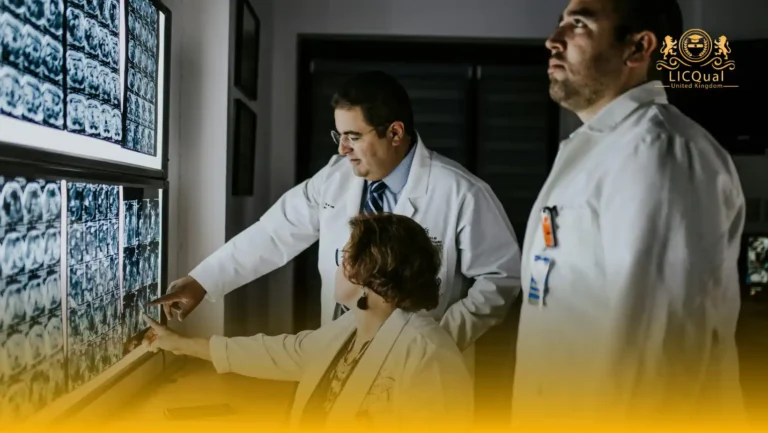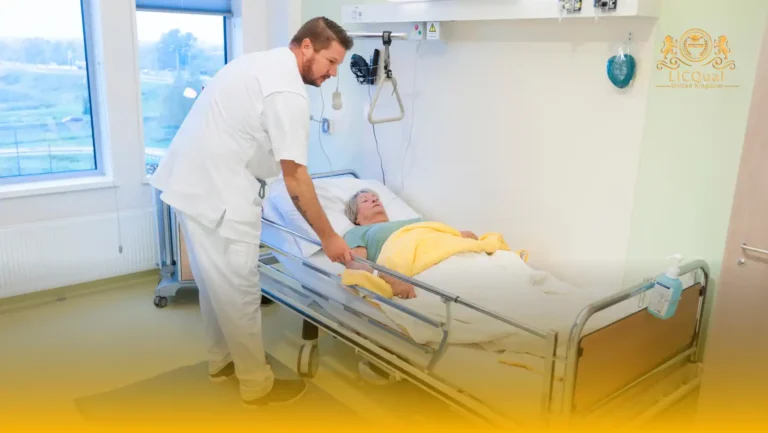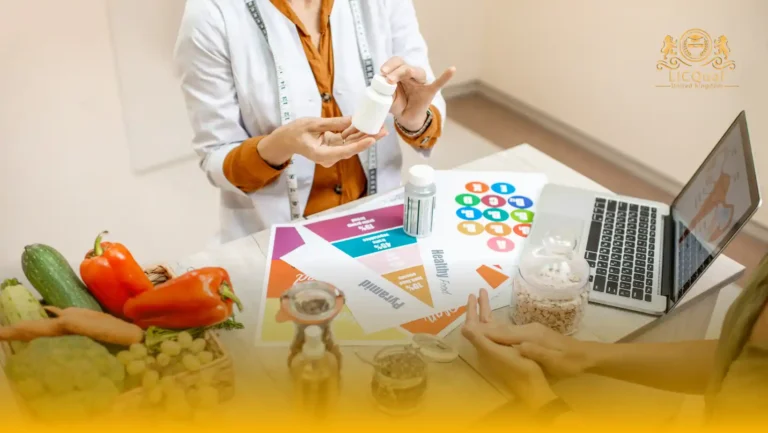The LICQual Level 6 Diploma in Tropical Medicine (Dip TM) is a specialised qualification designed for healthcare professionals and experienced practitioners seeking to advance their expertise in the field of tropical medicine. This Level 6 diploma is tailored to learners who already possess a foundational knowledge of medical or health sciences and are aiming to enhance their career prospects, broaden their clinical understanding, and strengthen their Continuing Professional Development (CPD).
This advanced programme equips learners with comprehensive knowledge of tropical diseases, their epidemiology, diagnosis, prevention, and management. It emphasises evidence-based practice, critical analysis, and practical skills necessary for effective decision-making in complex medical environments. Learners will gain insights into global health challenges, emerging infections, and public health strategies, preparing them for roles in clinical practice, research, and healthcare leadership.
Centres delivering the LICQual Level 6 Diploma in Tropical Medicine are required to maintain the highest standards of training. This includes providing competent and qualified staff, access to up-to-date learning materials, clinical resources, and a supportive learning environment that ensures each learner can achieve success. By combining theoretical knowledge with practical application, the course ensures that learners are fully equipped to meet the demands of tropical medicine and make meaningful contributions to their professional field.
Ideal for medical professionals, clinical researchers, and healthcare leaders, this diploma represents a significant step in career advancement and professional development within the global health and tropical medicine sector.
Course Overview
Qualification Title
LICQual Level 6 Diploma in Tropical Medicine (Dip TM)
Total Units
6
Total Credits
120
GLH
480
Qualification #
LICQ2200929
Qualification Specification
To enroll in the LICQual Level 6 Diploma in Tropical Medicine (Dip TM), applicants must meet the following criteria:
|
Qualification# |
Unit Title |
Credits |
GLH |
|---|---|---|---|
|
LICQ2200929-1 |
Principles of Tropical Medicine |
20 |
80 |
|
LICQ2200929-2 |
Infectious Diseases in Tropical Regions |
20 |
80 |
|
LICQ2200929-3 |
Clinical Tropical Medicine |
20 |
80 |
|
LICQ2200929-4 |
Public Health and Epidemiology |
20 |
80 |
|
LICQ2200929-5 |
Travel Medicine and Preventive Strategies |
20 |
80 |
|
LICQ2200929-6 |
Research, Leadership, and Professional Development in Tropical Medicine |
20 |
80 |
By the end of this course, learners will be able to:
Unit 1: Principles of Tropical Medicine
By the end of this unit, learners will be able to:
- Critically evaluate the principles and scope of tropical medicine.
- Analyse the global distribution and epidemiology of tropical diseases.
- Demonstrate understanding of the impact of environmental, socio-economic, and cultural factors on disease transmission.
- Integrate immunology and pathophysiology knowledge into evidence-based approaches in tropical medicine.
- Apply global health policies and disease prevention strategies to professional practice.
Unit 2: Infectious Diseases in Tropical Regions
By the end of this unit, learners will be able to:
- Identify and classify major parasitic, bacterial, and viral tropical infections.
- Analyse diagnostic methods and treatment protocols for tropical diseases.
- Evaluate emerging and re-emerging infectious diseases and their global impact.
- Apply evidence-based strategies to prevent and manage antimicrobial resistance.
- Develop management plans for complex tropical disease cases.
Unit 3: Clinical Tropical Medicine
By the end of this unit, learners will be able to:
- Conduct comprehensive clinical assessments for patients with tropical diseases.
- Interpret laboratory investigations and diagnostic results accurately.
- Apply differential diagnosis methods in tropical medicine.
- Develop effective patient management and monitoring strategies.
- Demonstrate awareness of ethical considerations and patient-centred care in clinical practice.
Unit 4: Public Health and Epidemiology
By the end of this unit, learners will be able to:
- Apply epidemiological principles to study the distribution and determinants of tropical diseases.
- Design and implement disease surveillance and outbreak investigation strategies.
- Evaluate vaccination, immunisation, and preventive public health programmes.
- Develop vector control strategies and other preventive measures.
- Promote health education and community engagement in endemic regions.
Unit 5: Travel Medicine and Preventive Strategies
By the end of this unit, learners will be able to:
- Conduct pre-travel risk assessments for individuals and groups.
- Recommend appropriate prophylactic measures and preventive medications.
- Apply vaccination guidelines and immunisation strategies for travellers.
- Develop risk management plans for health hazards during travel.
- Evaluate post-travel screening and management protocols for tropical diseases.
Unit 6: Research, Leadership, and Professional Development in Tropical Medicine
By the end of this unit, learners will be able to:
- Critically appraise research studies and evidence-based practice in tropical medicine.
- Design and implement research projects relevant to tropical healthcare.
- Demonstrate leadership and management skills in healthcare settings.
- Develop personal Continuing Professional Development (CPD) plans.
- Apply ethical, legal, and cultural principles in global health practice.
The LICQual Level 6 Diploma in Tropical Medicine (Dip TM) is ideal for medical and healthcare professionals who aspire to specialize in infectious and tropical diseases. This course is designed for individuals passionate about global health, disease prevention, and medical research in tropical regions. Whether you are a practicing doctor, nurse, researcher, or global health worker, this internationally recognized diploma provides the knowledge, skills, and confidence to tackle real-world health challenges and make a positive impact in global healthcare.
Medical Doctors and Physicians
- Deepen your clinical knowledge of tropical and infectious diseases.
- Learn advanced diagnostic and treatment techniques for tropical illnesses.
- Strengthen your ability to manage global health emergencies.
- Gain an internationally recognized qualification in tropical medicine.
- Prepare for medical missions or healthcare work in tropical regions.
Public Health and Epidemiology Professionals
- Enhance understanding of disease transmission and outbreak control.
- Study global health trends, epidemiological methods, and prevention strategies.
- Learn to design and implement disease surveillance programs.
- Gain skills in analyzing public health data for decision-making.
- Prepare for roles in government health departments and global organizations.
Nurses and Allied Health Practitioners
- Improve your ability to care for patients affected by tropical diseases.
- Learn early detection and clinical management of infectious diseases.
- Strengthen infection prevention and control practices.
- Gain confidence to work in tropical healthcare environments.
- Build expertise in patient education and community health awareness.
Medical and Biomedical Science Graduates
- Develop a strong foundation in parasitology, virology, and microbiology.
- Apply theoretical knowledge to real-world healthcare challenges.
- Build essential laboratory and research skills for disease investigation.
- Prepare for postgraduate studies in global or tropical medicine.
- Enhance your employability in hospitals, labs, and international agencies.
Humanitarian and NGO Workers
- Learn to manage healthcare programs in low-resource tropical regions.
- Understand community-based disease prevention and health promotion.
- Build leadership skills for health outreach and emergency response.
- Gain credibility working with WHO, UNICEF, or global relief organizations.
- Strengthen your ability to operate effectively in diverse field conditions.
Researchers and Academic Professionals
- Explore emerging tropical infections and innovative treatment methods.
- Conduct impactful research on global health and disease patterns.
- Collaborate with international research institutions and health bodies.
- Publish academic work in tropical medicine and epidemiology.
- Contribute to the advancement of scientific knowledge in public health.
Students Seeking Global Healthcare Careers
- Earn an internationally recognized qualification to work worldwide.
- Build the skills needed for careers in global health and infectious disease control.
- Prepare for opportunities with international healthcare and aid organizations.
- Gain hands-on knowledge in tropical disease management and prevention.
- Stand out in global medical and public health career pathways.
To ensure high-quality delivery and learner success, centres offering the LICQual Level 6 Diploma in Tropical Medicine must meet the following requirements:
- Qualified and Competent Staff: Centres must have experienced and professionally qualified tutors, instructors, and support staff with expertise in tropical medicine, infectious diseases, public health, or related healthcare fields.
- Comprehensive Learning Resources: Centres should provide up-to-date textbooks, journals, e-learning materials, case studies, and clinical references to support in-depth learning and research.
- Clinical and Laboratory Facilities: Access to appropriate clinical or simulated laboratory facilities is required for practical training, assessments, and skill development.
- Technology and IT Infrastructure: Centres must offer reliable IT resources, online learning platforms, and multimedia tools to facilitate blended or remote learning options.
- Supportive Learning Environment: Learners should have access to mentoring, guidance, and academic support throughout the course to maximise engagement and achievement.
- Assessment and Quality Assurance: Centres must implement robust assessment, feedback, and quality assurance systems to ensure compliance with LICQual standards and international best practices.
- Health and Safety Compliance: All practical and clinical training areas should meet health, safety, and ethical standards relevant to medical and tropical medicine practice.
Meeting these requirements ensures that learners receive a professional, high-quality education and practical experience, enabling them to achieve the LICQual Level 6 Diploma in Tropical Medicine successfully and advance their careers in global health and tropical medicine.
Assessment and Verification
All units within this qualification are subject to internal assessment by the approved centre and external verification by LICQual. The qualification follows a criterion-referenced assessment approach, ensuring that learners meet all specified learning outcomes.
To achieve a ‘Pass’ in any unit, learners must provide valid, sufficient, and authentic evidence demonstrating their attainment of all learning outcomes and compliance with the prescribed assessment criteria. The Assessor is responsible for evaluating the evidence and determining whether the learner has successfully met the required standards.
Assessors must maintain a clear and comprehensive audit trail, documenting the basis for their assessment decisions to ensure transparency, consistency, and compliance with quality assurance requirements.







